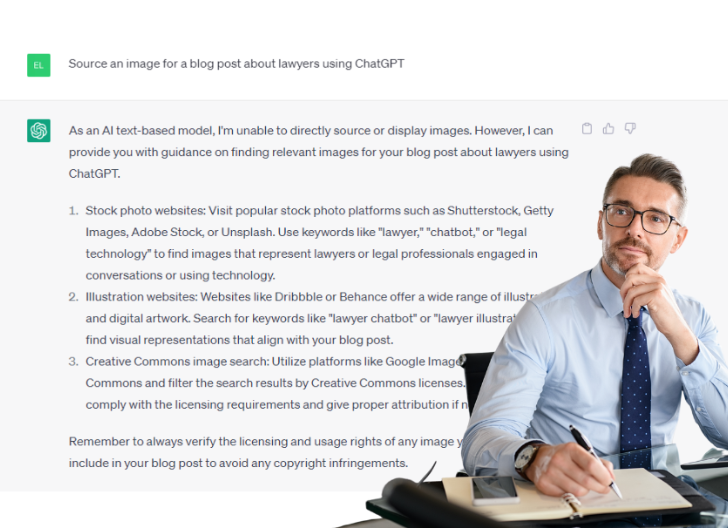This guest post was authored by Patrick Austin, an attorney who practices in the Richmond, Virginia Area.
The use of AI in the practice of law poses some of the most complex and challenging issues the legal profession has confronted in decades. Embracing AI technologies opens up a Pandora’s box of important ethical, financial and structural questions with no clear-cut answers. As a result, if someone asks – Is ChatGPT for lawyers? The best answer at this time is… it depends.
What is ChatGPT?
ChatGPT is a groundbreaking AI Chatbot developed by OpenAI, an artificial intelligence research laboratory backed by Microsoft, Inc. The AI chatbot utilizes a language-based learning model that OpenAI routinely updates and modifies to better simulate human interaction.
ChatGPT works by compiling data from across the internet and using computing predictions to help answer questions and queries inputted by customers. The responses generated by ChatGPT are essentially prompts to textual requests and information. The AI chatbot in turn “learns” more about an of subjects and how to discuss them. In effect, the more people use ChatGPT, the “smarter” the AI technology becomes and the better it can be at responding to additional queries.
ChatGPT has quickly become a popular tool for accomplishing the following tasks and assisting with the following projects:
-
Efficiently creating computer code
-
Writing online content (e.g., articles and blogs)
-
Translating content into different languages
-
Debugging computer systems
-
Providing recommendations for food recipes, business plans, directions, reviews, etc.
Can You Use ChatGPT as a Lawyer?
The answer is…generally, yes. It is possible for lawyers to use ChatGPT. Whether you use it in a personal or professional capacity, there is no denying ChatGPT is a powerful tool that is likely to impact the legal industry in a variety of ways. ChatGPT, and related generative AI tools, have the potential to assist lawyers in completing projects and addressing client matters more efficiently, effectively, and accurately. The benefits derived from ChatGPT in a legal context are typically associated with the automation of routine tasks, which thereby frees up more time for lawyers to focus on more complex, high-value tasks and matters. For example, it is possible to use ChatGPT for:
-
Legal research
-
Drafting documents
-
Scheduling appointments
-
Better managing client relationships
Of course there are many other ways to improve law firm productivity that don’t involve giving legal work to robots. And NBI offers a variety of resources to help get you there, with with programming on topics like improving workflows at law firms, making the transition to a paperless practice, and creating and maintaining a strong digital presence.
How AI is Changing the Legal Industry
There has been a significant amount of “buzz” concerning the impact of generative AI tools, like ChatGPT, on the legal profession. Some people are even worried that ChatGPT and AI will soon replace lawyers altogether. Such a future where “the robots take over” is a bit fanciful. Let’s all take a collective breath and remember that, even though AI has the capacity to assist lawyers with research and other tasks, it is highly unlikely these AI tools will ever fully replace lawyers. Why? Because the legal profession still primarily involves human interaction, human interpretation, and human judgment. The practice of law is inherently personal, meaning a robot or AI tool cannot simply step into the proverbial shoes of a lawyer and excel in the practice of law. AI simply cannot replace human judgment, empathy, compassion, and creativity.
With that said, it is likely AI will play a role in the legal profession going forward. This is because many AI tools have displayed the capacity to help improve the speed and accuracy of legal research and analysis thereby freeing up lawyers to focus on more complex tasks requiring human judgment and interaction. The efficiency afforded by AI tools could also help make legal services more accessible and affordable to a broader segment of the population. Nevertheless, it is important to remember that AI is simply a tool in the proverbial legal toolkit.
Tips for Using AI in Law Firms
The implementation of ChatGPT, and related generative AI tools, in a law firm setting involves addressing a myriad of issues, including:
-
Assessing and determining the specific needs of the firm
-
Properly vetting and selecting a ChatGPT provider
-
Training the chatbot
-
Thoroughly testing the chatbot
-
Providing proper training to law firm attorneys and staff on how to effectively use the ChatGPT chatbot, or related AI tool.
Of these issues identified above, proper training is one of the most important. Why? Because training will be needed for both law firm personnel and the chatbot itself. This may mean allowing the chatbot to access sensitive data, including client information within a law firm’s system of records. As a result, here is the key tip for using AI in law firms – be thorough and cautious.
Legal Risks Associated with Using ChatGPT and Similar AI Tools
Given the fledgling nature of generative AI tools like ChatGPT, it is important to understand the legal risks of ChatGPT and other AI tools. There remain important, unanswered questions related to ChatGPT and data privacy (primarily how ChatGPT collects, processes, and stores sensitive personal information), the impact of ChatGPT on intellectual property, and the risk of running afoul of major regulations such as the European Union’s General Data Protection Regulation or California’s Consumer Privacy Act. Additionally, there are a bevy of ethical risks that come into play whenever a machine is performing legal work. We can look to the eDiscovery space for a taste of those issues, where AI/machine learning has been employed to assist in document review for years.
Lawyers and law firms need to conduct a thorough assessment, including a cost-benefit analysis, to properly determine whether the benefits of using AI tools, as described above, are worth the potential legal risks associated with using ChatGPT and related generative AI tools.
Criteria for Selecting AI Legal Software
When choosing AI legal software, it is important to remember that much like every legal project has unique facets and features, there are unique facets and features within AI legal software. There will likely be a diverse set of data with different variables, integrations in or with existing software or hardware and different expectations and overarching goals. As a result, here are some key points to consider when selecting AI legal software:
-
Vet the technology, understand how it works, and consider the ethical and non-ethical risks associated with using it
-
Consider the steps associated with data protection and preparation
-
Assess whether the AI legal software provides for scalability
-
Determine whether you will be able to easily integrate the AI legal software into your existing way of working
-
Assess whether the data models within the AI legal software are updated with sufficient frequency to properly serve your project or client matter
Looking Ahead
The utilization of AI by law firms and in the practice of law generally is an ever-evolving issue. But something we can probably all agree on is, the times they are a changin’ and it is important to be nimble and remain aware of these complex issues going forward.
Ready to see where you stand? Take the FREE 5-minute Legal AI Readiness Scorecard and get a personalized action plan:
Take the quiz

Patrick Austin is an attorney specializing in administrative law, including regulatory and compliance matters with experience working in both the public and private sector. Patrick graduated from Old Dominion University in 2009 with a BA in Technical & Professional Writing. He then went on to attend George Mason University School of Law and graduated in 2013. Upon passing the Virginia Bar Exam, Patrick went into private practice joining a boutique law firm focused on civil litigation. Patrick gained invaluable experience overseeing pre-trial discovery, responding to complaints, taking and defending depositions, and so forth. Patrick currently practices law in the Richmond, VA area.
This post was written by a guest blogger. Although this article was thoroughly reviewed by NBI staff, the views, opinions and positions expressed within the post are those of the author alone and do not represent those of NBI. The accuracy, completeness and validity of any statements made within the post are not guaranteed. We accept no liability for any errors, omissions or representations.

